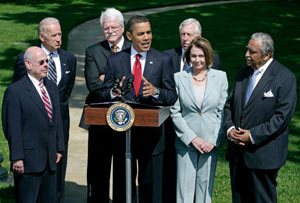 |
| On May 13th, President Obama called on Congress to pass health care legislation before the August summer recess. He is flanked (left to right) by Rep. Henry Waxman, D-Calif.; Vice President Biden; Rep. George Miller, D-Calif.; Majority Leader Steny Hoyer, D-Md.; House Speaker Nancy Pelosi, D-Calif.; Rep. Charlie Rangel, D-N.Y.. Pelosi promised a bill by the end of July. (Mark Wilson/Getty Images) |
History is clear: When it comes to something as contentious as overhauling the health care system, there are no safe bets.
Presidents from Theodore Roosevelt to Richard Nixon to Bill Clinton failed at ambitious attempts to change the health care system, and “you might argue, based on history, that that’s the most likely scenario,” says Michael Cannon, director of health policy studies at the Cato Institute, a libertarian think tank in Washington.
“It will be hard,” President Barack Obama acknowledged in a speech earlier this year to Congress. But he added, “Let there be no doubt: Health-care reform cannot wait, it must not wait, and it will not wait another year.”
Action is about to accelerate. Democratic Sens. Edward Kennedy of Massachusetts and Max Baucus of Montana are close to introducing separate bills to expand coverage to the uninsured and remake the health care system. House Democrats are working on their own versions.
The biggest challenge: The price tag. The Democratic proposals could cost $1 trillion to $1.5 trillion over 10 years, and lawmakers are a long way from coming up with the money.
The biggest unknown: How forcefully will Obama engage, and what’s his bottom line? Will he go for broke, insisting on a big expansion of health coverage and sweeping changes to the health care system? Or will he be more pragmatic, quicker to compromise than, say, the Clintons were–so as not to lose everything?
Here are three scenarios on how the health care battles of 2009 might turn out:
DEMOCRATS WIN BIG
Defying skeptics, Congress passes comprehensive health care legislation in late fall. Shortly before Christmas, Obama holds a signing ceremony at the White House. Flanking the president, Democratic leaders beam at the prospect of heading into the 2010 elections with a major domestic triumph. Selected Republicans are on hand as well.
To pull this off, congressional Democrats and Obama would have to convince the public that the legislation would not only help the 46 million uninsured but also restrain rising health costs, bolstering the middle class as well. “A lot of senators are concerned about the rate of increase in the cost of health care in America,” says Baucus. “It’s sobering. That realization is a big driver to do it and do it right.”
Democrats would have to stay unusually unified while maneuvering to pick up some Republican votes. The legislation would have to “sufficiently honor” Republican values of “choice and incentives and markets” and assure Democrats that it would cover most of the uninsured and begin to put a dent in rising spending, says Len Nichols, director of the Health Policy Program at the centrist New America Foundation in Washington.
Included in the resulting package would be an insurance “exchange,” a kind of marketplace where individuals and businesses could buy coverage from private carriers or perhaps a new government-run plan. In addition, there would be requirements that all Americans have insurance, and that insurers sell coverage even to people with health problems. Employers would have to cover their workers or chip in something to help pay for the uninsured. Medicaid, the state-federal health program for the poor, would be expanded.
The legislation also would likely offer substantial subsidies to help lower- and middle-income individuals buy the insurance, and require that insurers provide certain minimum benefits. It would provide tax credits for small businesses.
To help finance such a costly package, Democrats would likely have to dip into a big honey pot–the tax break for workers with employer-provided health care benefits, which totaled $226 billion in 2008. Lawmakers appear to be considering two options: Taxing workers with more-generous health plans on a portion of their benefits or taxing only higher-income people.
In any case, Democrats would face the formidable challenge of selling the new tax as a way to improve the economic security of families and the nation. Complicating their task: Obama’s campaign attacks on a proposal by Republican rival John McCain to eliminate the tax break and replace it with tax credits.
There are other problems: Kennedy, chairman of the Health, Education, Labor and Pensions Committee, has indicated he’ll press for a muscular public plan to compete with insurers, while Baucus, chairman of the Finance Committee, has been less committal, partly because of Republican opposition. He’s hoping for bipartisan support so he can avoid using the reconciliation process to push the bill through; that procedure would require only 51 votes for approval but anger Republicans.

In 1994, this “Harry and Louise” ad contributed to the collapse of President Bill Clinton’s health reform efforts. Some think ad campaigns and political infighting could foil attempts this year as well.
Democratic leaders want the House and Senate to pass health care legislation before the August break. After Labor Day, a conference committee would work at combining what’s likely to be a more left-leaning House bill and a more-conservative Senate plan.
If the Democrats get that far, they’ll ultimately agree on a major package, predicts Joseph Antos, an economist at the American Enterprise Institute, a conservative think tank in Washington. “Democrats know they have to give Obama health reform,” he says.
CRASH AND BURN
As the summer gets hotter, the Champagne stays in the White House fridge. Legislation that started out in June looking like a 21st Century New Deal for health care gets bogged down as some moderate Democrats, Republican critics and industry officials get more insistent: The plan is too expensive. It depends too heavily on taxing the middle class. It does too little to control spiraling costs.
Attempts at compromise flag as President Obama and Democratic leaders cling to the goal of universal coverage. Republicans, smelling blood, move to exploit the fissures among the Democrats. Conservative groups roll out ads focusing on the high cost of the overhaul, the new taxes needed to pay for it, and the specter of a government takeover of the health system.
Such a scenario could unfold, some observers say, if Democratic leaders overreach, pressing for an expensive bill that upsets moderate Democrats like Sen. Evan Bayh of Indiana and Republicans like Iowa Sen. Chuck Grassley, the ranking member of the Finance Committee. If they defect, they’ll take others with them.
A similar dynamic could unfold in the House, if the fiscally conservative “Blue Dog Democrats” reject the health proposals as too expensive, or not fully paid for by tax increases and spending cuts.
“The biggest risk is a fractured Democratic caucus,” says Dan Mendelson, a budget official in the Clinton administration and now president of Avalere Health, a Washington consulting firm.
Under another failure scenario, the industry, after holding its fire for months, turns against the overhaul effort, joining with Republican opponents and pumping cash into negative ads. “If the entire industry starts gunning at this, it will go down,” says Mendelson.
So far, health care interests–including insurers, hospitals and doctors-have held their fire. But the grousing has started: Hospitals are complaining about Medicare cuts, for example, while insurers are criticizing the public-plan idea, saying it would pose unfair competition.
For the most part, though, says Robert Reischauer, president of the Urban Institute, a Washington think tank, health care interests have been acting like happy campers. That could change overnight as legislative details emerge. Then, he says, the campers wake up “and the camp counselor says, ‘There’s no food.’ We’ll see how the campers respond.”
Some non-health care interests already are mobilizing. The beverage industry is fighting plans to raise money by taxing alcohol and high-sugar drinks. Unions are fuming at the notion of taxing employee health benefits.
Meanwhile, Republicans, scrambling for influence, are countering with their own plans. One group of conservatives recently introduced a bill that has some similarities with Democratic proposals, but differs in several important respects. It doesn’t, for example, require everyone to carry insurance and it would eliminate the tax break for employer-provided health care, replacing it with a tax credit.
With “so many people who can say no, there’s still a decent possibility that it will fall apart,” says Stuart Butler, vice president for domestic and economic policy studies at the Heritage Foundation, a conservative think tank in Washington.
Some fellow conservatives disagree. “This won’t crash and burn,” says Grace-Marie Turner, president of the Galen Institute, a market-oriented research organization based in Alexandria, Va. “The question is how far can they go.”
HALF-A-LOAF, or LESS
Fall is in the air and next year’s congressional elections suddenly seem a lot closer as the Democrats and Republicans each declare victory in the battle over remaking the health care system. Sure, the Democrats didn’t get universal coverage or a public plan. But the legislation Obama signs extends coverage to several million Americans who lack it, takes a stab at making the system more efficient and creates a framework for future changes if and when Congress and the president are ready for them. Republicans, meanwhile, boast that they stopped government-run health care in its tracks while providing modest tax credits for small businesses.
If a full-blown Democratic overhaul is derailed by cost and complexity, the half-a-loaf scenario could emerge. Determined to send Obama something, Democrats would patch together a scaled-back bill.
“The political scenario,” says Reischauer, “is the realization that the whole loaf or ¾ of a loaf is out of reach and the alternative of doing nothing is very damaging to the president and to the Democratic Party. You have to declare victory over something.”
Such legislation could still involve significant changes, but perhaps extended over a longer period of time, say 15 years, to stretch out the costs. It could also increase the number of people with insurance, but fall far short of universal coverage.
The legislation also could include a Medicaid expansion, and create insurance exchanges for individuals and very small businesses. It might not include a requirement that all Americans carry insurance; absent that, insurers couldn’t be compelled to accept all applicants, because they might get stuck with a lot of people who buy coverage only when they get sick.
To placate the AARP, the seniors’ group, Congress could allow people aged 62 to 64-or perhaps even younger–to buy into Medicare, and possibly provide some subsidies.
Another possibility: Rather than having a public plan everywhere, it might only be available where consumers don’t have at least two choices of private insurance. The package also could include a stepped-up focus on prevention and on paying doctors and hospitals according to their performances.
Don’t rule out something even more bare bones and incremental-perhaps just a Medicaid expansion. Even that, however, could be controversial, given Republicans’ antipathy toward expanding public programs.
Just about any significant expansion of coverage would likely be hailed by congressional Democrats and the White House. They could point to earlier victories this year expanding the Children’s Health Insurance Program and providing billions of dollars for health information technology, research into what drugs and treatments work best and preventive care. Republicans, meanwhile, would be relieved that Democrats’ greatest ambitious remained in check, for now.
Under this scenario, “there will be a lot of movement without necessarily a lot of substance, but it will be a best try,” says former Republican Rep. Bill Thomas, who headed the House Ways and Means Committee. “Everyone will pump it up.”






